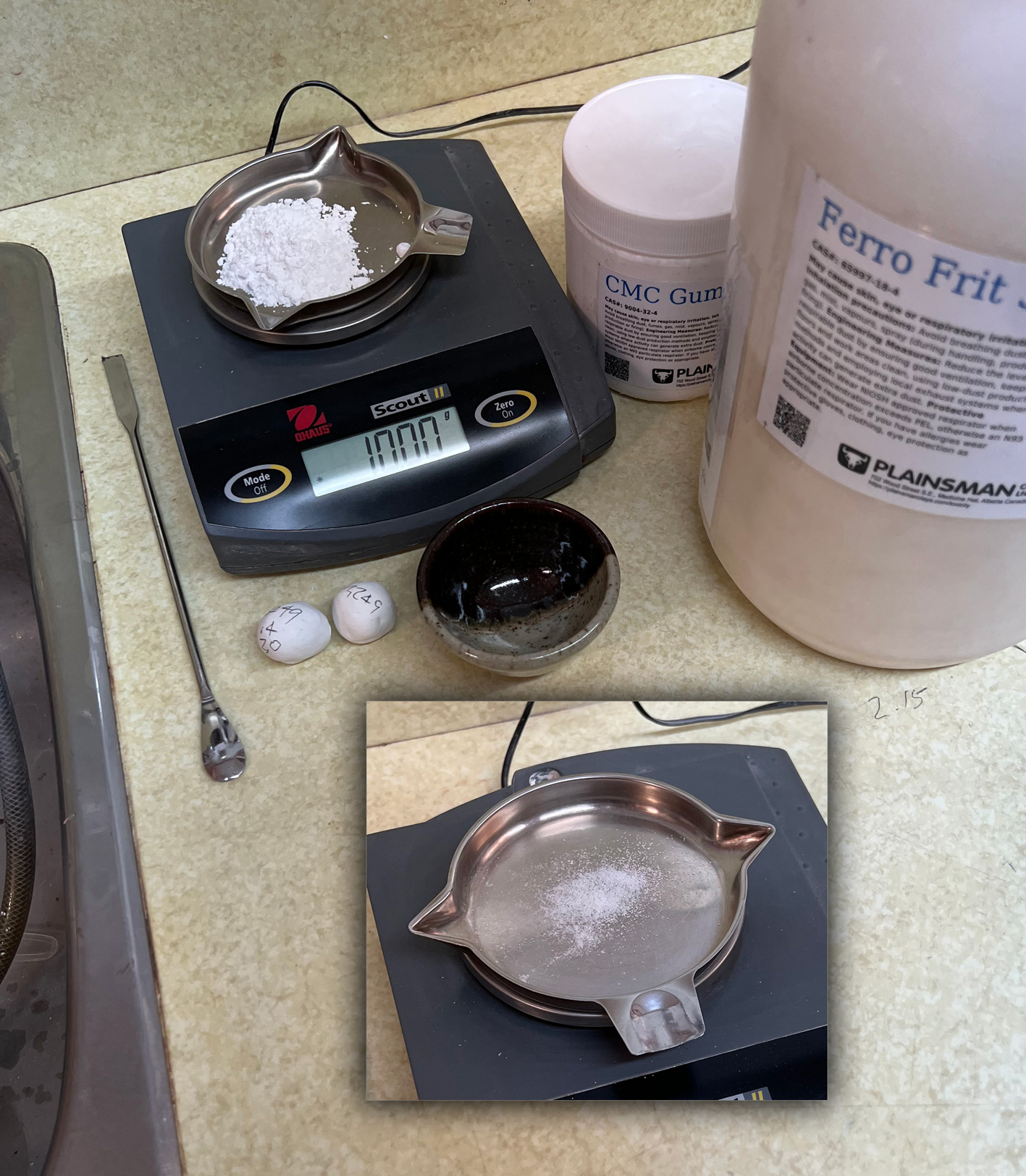| Monthly Tech-Tip | Feb 14-15, 2026 - Major Server Upgrade Done | No tracking! No ads! |
Preparing balls for a melt fluidity test using CMC gum
We use 11g of the material being tested, e.g. a frit, (the right amount for one ball), 0.11g CMC (1%). Of course, you need a 0.01g scale to be able to accurately weigh 0.1g (that is a really small amount). Put them in a small ziplock bag, zip it to entrap air and roll the zipper down to inflate it. Shake well to mix. Stir the powder into water (~5-8g) in a small bowl. Pour it onto a plaster slab - it dewaters very quickly (e.g. as little as 10 seconds) - just as the water sheen is gone, peel it up with a rubber rib. Smear it back down and peel it up every few seconds until it is plastic and formable (but not sticky). For better formability use 1.5% CMC gum - however, the ball will dry slower - drying time is an issue with this method, you will need a heat lamp or other drier of some sort (e.g. a dehydrator). You will also need a plaster surface to absorb the excess water (which invariably happens).
Related Pictures
Frit Melt Fluidity Comparison - 1800F

This picture has its own page with more detail, click here to see it.
Fired at 350F/hr to 1800F and held for 15 minutes (I already did firings from 1300F-1750F in 50 degree increments, all of them are visible in the parent project). Frit 3110, 3134, 3195, F75 have run all the way down. All of the frits have softened and melted slowly over a range of temperatures (hundreds of degrees). By contrast, Gerstley Borate, the only raw material here, suddenly melted and flowed right over the cliff (between 1600 and1650)! But not before Frit 3602 and FZ16 had done so earlier. Frit 3249 is just starting to soften but F69 (the Fusion Frits equivalent) is a little ahead of it. LA300 and Frit 3124 are starting also. F524, F38, F15 will all be over the end by the next firing. The melt surface tension is evident by the way in which the melts spread out or hold together.
Preparing balls for a melt fluidity test using Veegum

This picture has its own page with more detail, click here to see it.
This method uses 3% Veegum. A 0.01g scale is required (the amount of Veegum needs to be precise since it affects melting). Weigh 11g of the frit and 0.33 of Veegum. Put them in a small ziplock bag, zip it to entrap air and roll the zipper down to inflate it. Shake well to mix. Stir the powder into water (~5-8g) in a small bowl. Pour it onto a plaster slab - it dewaters very quickly (e.g. as little as 10 seconds) - just as the water sheen is gone, peel it up with a rubber rib. Smear it back down and peel it up every few seconds until it is plastic and formable (but not sticky). Roll it into a ball, label it and dry it under a heat lamp (this could take an hour, the Veegum really holds on to the water). When dry we use a sharp knife to cut off enough to bring it down to 9 grams. One caveat: The Veegum is a melting catalyst, balls will flow noticeably more, this is not an issue if you are comparing the melts of two materials (but it is for tests meant to be absolute).
Glaze Melt Fluidity Not Evident on Typical Tests

This picture has its own page with more detail, click here to see it.
We wanted to compare the melt fluidity of G2934Y (left) to G2934 (right). To do that we prepared GBMF test balls (see below). The forming and drying process leave a flat spot so the gumball-sized balls are easy to place on a porcelain tile. During firing, they flatten out. The degree to which they do acts as a measure of the flow (when compared with another). Many characteristics that one would not observe on glaze tiles reveal themselves in this test. In this case, we needed to know if the melt flow was at least as good. This proves it is better (the ball on the left has flattened and spread out more). Reactive glazes tend to be the norm in recent years, the main characteristic that produces their fired appearance is the high melt fluidity.
Videos
Links
| Glossary |
Ceramic Binder
Binders are glues that harden ceramic powders as they dry. They enable improved surface adherence. And slower drying. |
| Materials |
CMC Gum
CMC gum is indispensable for many types of ceramic glazes. It is a glue and is mainly used to slow drying and improve adhesion and dry hardness. |
Got a Question?
Buy me a coffee and we can talk

https://digitalfire.com, All Rights Reserved
Privacy Policy

